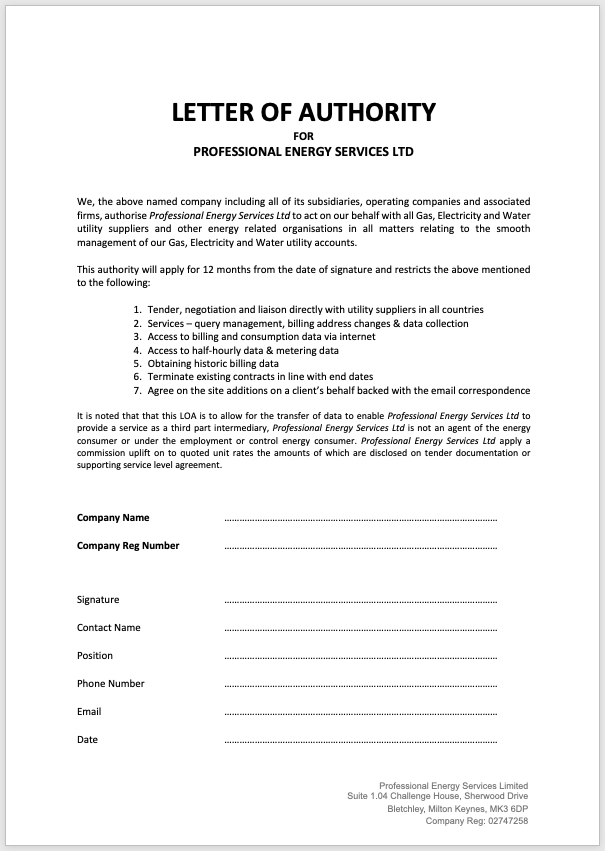
What is a Letter of Authority (LOA) in Business Energy
In the energy industry, ‘Letters of Authority’ are vital in switching energy suppliers when using the services of an energy broker or energy consultant. It is not possible to progress without one, however, you may have never heard of the term before and could be wondering why you need one in the first place.
In this article we have put together the most common questions on Letters of Authority (LOAs) such as; what they are, how they work, key considerations when signing one, and more.
If you’re about to select an energy broker to help you switch energy suppliers then understanding the LOA is a must and we hope this article will help you in getting an LOA in place as you start a new partnership with a broker or consultant.
What is a Letter of Authority?
A Letter of Authority (LOA) is a legal document that is used to declare and authorise a third-party business to act on behalf of their customer to liaise and negotiate with that customer’s potential suppliers.
Therefore, in business energy management it acts as a formal permission slip, authorizing an energy broker or consultant to correspond with energy suppliers on your behalf.
This document stipulates the extent of the broker’s powers, ensuring they can only act within pre-defined boundaries and safeguards your business by formally documenting the broker’s role and responsibilities.
Why should I use a Letter of Authority to empower an energy broker to switch energy suppliers?
Comparing energy prices to select the best deal is time consuming and requires specialist knowledge in understanding the different usage terms and tariffs, on top of this there is a lot of admin involved in managing suppliers and negotiating with newly selected ones.
Not only does using a broker streamline the process of managing business energy contracts, but the LOA serves as a layer of legal protection, defining clear limits to the broker’s authority to prevent unauthorized actions.
The LOA will help maintain and foster a relationship built on trust and clearly set expectations with your potential broker.
What Does an LOA Allow an Energy Broker or Consultant to Do?
As mentioned, the LOA is required before an energy broker or consultant can even communicate with a supplier about switching providers. Here are the usual permissions the LOA authorises the broker to do:
- Request Information: Brokers will be able to access both current and historical data from your energy provider, including energy consumption data, supply numbers, pricing history, and contract end dates. This information allows the broker to better understand your business and energy habits, it is crucial for assessing your energy needs accurately and allows the broker to negotiate a better deal because they will know information like the maximum amount of consumption needed, the minimum levels of consumption, how much you use on average and other key factors that all influence the usage and pricing of a business energy contract.
- Search for Deals: With detailed insights into your energy consumption and costs, brokers can search the market for the best deal suited to your business and negotiate with multiple suppliers to secure the best rates and contract terms.
- Begin the Switching or Renewal Process: Brokers can handle all the necessary paperwork to transition from your current supplier to a new supplier, or the business energy renewal process with better terms with your existing supplier. This process includes submitting necessary documentation and ensuring compliance with energy regulations.
- Manage Current Supplier: Your broker will act as the primary contact point for any queries related to services with your current supplier, streamlining communications and resolving issues swiftly.
- Manage Billing Information: Brokers will have access to and management of all billing and invoice documents. This enables them to handle and query any credit notes, direct debits, bank details, discontinuation notices, payment reminders and energy bill validation concerns.
- Organise Maintenance and Services: Brokers can schedule necessary energy related maintenance or service appointments, such as meter installations or boiler services, ensuring that your energy infrastructure is up-to-date and operating efficiently.
- Submit Meter Readings: To avoid estimated bills and ensure accurate billing, brokers can submit actual meter readings on your behalf, directly influencing your billing based on actual consumption.
- Handle Complaints: If issues arise, brokers can lodge complaints with your energy supplier on your behalf, managing any subsequent negotiations or communications to resolve the situation which saves you the hassle and frees up more of your time.
Can an energy broker agree a contract on your behalf with an LOA?
Yes and No, this all depends on the type of LOA that is agreed upon. A ‘Level 1’ LOA does not allow brokers or consultants to agree new contacts, despite handling the majority of the process, the final sign off and agreeing terms require your consent and signature with the supplier. Whereas a ‘Level 2’ LOA would allow the broker to be signing on your behalf.
At Professional Energy Services, ‘Level 2’ is only used on specialist services with clients who are comfortable with a fully outsourced accounts payable service where the requirement is the management of all contract and billing payments, and the ability to renew or switch energy supplier contracts on behalf of the client. Clients not wishing to use outsource their accounts payable processes will only require a level 1 LOA.
How Long Is a Letter of Authority Valid For?
The LOA will include how long it is valid for so make sure you check the document, is it most common for them to last 12 months or the same duration as the fixed term contract you are agreeing with your energy broker. Once expired your broker will issue a new LOA for approval to avoid any disruption in service, otherwise you will need to perform the duties they were doing as a broker is unable to work without a valid LOA.
How to Write a Letter of Authority
It is typical for brokers and consultants to write a Letter of Authority, however you can make changes and send them back to your broker to review. Transparency and clear communication with your broker will ensure both parties are in agreement on the clauses within the document.
However, if you do decide that you want to write the LOA yourself then we recommend you ensure it includes the following:
- Your company letterhead for authenticity.
- Clearly state the purpose of the LOA and the specific powers you are granting to the energy broker. This includes actions they are authorized to perform, such as negotiating contracts and obtaining consumption data. Specify any limitations to prevent any overreach of their role.
- Detail the validity period
- Include the full business details, registered address, company registration number and contact information for both your company and the broker.
- It is paramount to ensure the language is clear and straightforward. To avoid any ambiguities.
- Accurate contact details of who will be signing the LOA.
Example of a Letter of Authority
Below is an example LOA that Professional Energy Services has issued to our prospective clients:

Who can sign a LOA and is it safe to?
Anyone within a business can sign a LOA, however the LOA should clearly name the recipient who is expected to sign the document and this would have been agreed prior to the LOA being written by the broker who issues the document.
Whenever you’re required to sign a legal document like a Letter of Authority (LOA), it’s crucial to thoroughly read and understand the contents before signing. At Professional Energy Services, the LOA authorises our energy consultants to communicate with your suppliers on your behalf. Without a signed LOA, however, we will not be able to proceed with processing your requests. Remember you do not have to sign something that you do not agree with and are free to suggest changes which can be discussed and agreed on.
Considerations Before Signing a LOA
Before signing a Letter of Authority, it’s crucial to perform due diligence to ensure the document aligns with your business objectives and legal standards. Consider the following:
- Scope of Authority: Verify that the powers granted are necessary and appropriate for the broker’s intended role.
- Broker Credentials: Confirm the broker’s reputation and track record to ensure they are trustworthy and competent. To do this you can check the following:
- they are fully registered on companies house
- Their financial health by reviewing their public accounts via companies house
- If they are an accredited broker they will be listed by the Utilities Intermediaries Association (UIA).
- Legal Review: It may be beneficial to have a legal expert review the LOA to ensure it protects your interests and does not expose you to undue risk.
- Limitations and Exclusions: Check for any clauses that limit the broker’s power and specify actions they cannot take without your explicit consent.
- Termination Conditions: Understand the terms under which either party can terminate the LOA, ensuring that you are not locked into an unfavourable agreement.
Taking these steps will help ensure that the LOA serves its intended purpose without compromising your business’s operational or financial security.
What Happens After a Letter of Authority is Submitted?
Once a Letter of Authority is submitted, the energy broker will commence their role as an intermediary between your business and the energy suppliers. The submitted LOA becomes the green light for the broker to start gathering information, obtaining quotes, and engaging in discussions on your behalf. The letter is valid from the date signed and ensures there are no delays in comparing business energy quotes.
Will LOAs Be Different for Different Companies?
Letters of Authority can vary significantly between different companies due to unique business needs, legal requirements, and specific energy management strategies. Each company may tailor its LOA to include particular terms, conditions, and scopes of authority that best suit its operational framework. For example, some LOAs are referred to as a ‘Level 1’ or ‘Soft LOA’, and these only authorise brokers to obtain information and procure different quotes, whereas a ‘Level 2’ or ‘Full LOA’ has the same authorisation but grants additional powers for the broker to into contracts on your behalf. Before signing an LOA, it’s essential to understand these differences and ensure that the document aligns with your company’s specific requirements and industry standards.
Can I Cancel a LOA Once Signed?
Cancelling a Letter of Authority once it has been signed is possible, but the process depends on the terms and conditions you agreed to when signing the document. Typically, an LOA will include a clause that specifies how either party can terminate the agreement. This might involve providing written notice within a specified timeframe or under certain conditions. Always check for any potential penalties or obligations that may arise from cancelling an LOA.
Get in touch if you would like to speak to an energy consultant who can support your business in switching energy suppliers or renewing your business energy contract with your existing supplier and finding the best deal for your business.
Related Posts

How to Choose a Business Energy Contract in 2024

A Guide to Business Energy Contract Renewals

